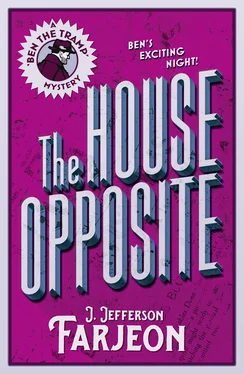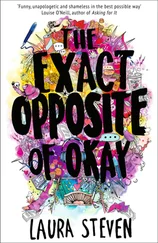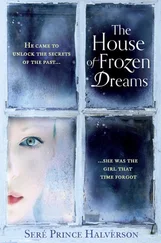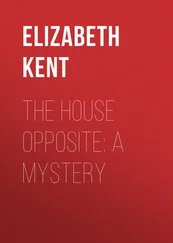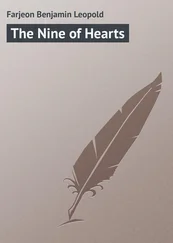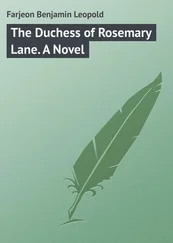‘No. I’m surf-ridin’.’
The Indian smiled. So did the coffee stall keeper. The coffee stall keeper’s smile was ever so much the nicer.
‘Here’s your tea, mate,’ grinned the latter. ‘Want anything to eat with it?’
‘Yus, ’am sandwich,’ replied Ben, ‘and don’t fergit the ’am.’
He drank the tea in one go, and shoved the cup across the counter for replenishment. The Indian watched him, still smiling. The coffee stall keeper took the cup, and turned away for a moment. Then the Indian bent forward suddenly, bringing his face within six inches of Ben’s. It became magnified, like a close-up. The smile seemed to expand all round him.
‘You are sensible,’ said a voice in the middle of the enormous smile. ‘See that you stay so!’
The coffee stall keeper turned back with the cup.
‘Well, I’m blowed!’ he exclaimed. ‘Where’s he gone?’
The Indian had vanished.
Ben rubbed his forehead. He felt as though the Indian’s eyes were still upon him, and he wanted to get rid of them. He’d been through some nasty moments in his life; sometimes, indeed, he doubted whether there were any really nasty moments he hadn’t been through; but the moment when the Indian had suddenly advanced his face and become a close-up was one of the very nastiest he could remember …
‘Rum chaps, them Indians,’ remarked the coffee stall keeper, breathing on a spoon and polishing it, ‘but I like ’em.’
‘I loves ’em,’ replied Ben.
‘Aunt of mine used to board ’em,’ went on the coffee stall keeper, ‘and she used to say nicer people she never met. But, of course, you get all kinds.’ He leaned forward, and dropped his voice confidentially. ‘Between you and me, mate,’ he said, ‘I wouldn’t much care to sleep in a room next to that one!’
‘That’s right,’ murmured Ben.
‘If he was peckish, like as not he’d slice out your liver and have it for breakfast!’
He burst into guffaws at the joke. Ben did not join in. The coffee stall keeper looked disappointed, and tried something else.
‘Fancy them findin’ that old man in Bermondsey ’angin’ upside down!’
‘’Ere, you’re a little ray o’ sunlight, ain’t yer?’ barked Ben.
He finished his second cup quickly, paid his account, and turned away.
Which direction should he take? Left—towards Jowle Street? Or right—towards peace? Suddenly he fished a coin from his pocket.
‘’Eads, it’s Jowle Street,’ he muttered, ‘and tails it ain’t!’
He tossed. The coin came down tails.
‘It ain’t,’ he murmured.
And turned towards Jowle Street.
5
The Contents of a Parcel
HAVE you ever paused to realise the different mental attitudes of those who, superficially, appear to be engaged on business identical with your own? In a street, for instance, as you pass from one point to another?
To you a journey between two lamp-posts may be a forgotten incident, making no record in your mind. To the woman you overtake so carelessly it may be an eternity, though once her feet travelled as lightly and as fast as yours. To the young man who unconsciously keeps pace with you on the other side of the road it is a journey of breathless wonder, while each step brings him nearer to the whole meaning of existence waiting for him round the corner. To the elderly man, impelled to equal speed ten yards behind, it is a tragedy, with a doctor’s house at the end of it.
Ben, on his way back to Jowle Street, was separated by similar gulfs from those he moved among, walking through a disturbing world of his own. It was not the world of the little whistling errand-boy he passed. It was a darker, grimmer place. A sort of tunnel, the sinister walls of which were closing in on him and pressing him forward. At the end of the tunnel were Indians with cynically smiling eyes, and a nasty old man gesticulating at a window—funny how that nasty old man stuck in Ben’s mind!—and a chap hanging upside down. And towards all these things, despite the kindness of a tossed coin, Ben was moving. Why?
Yes—why? Ben stopped suddenly, and asked the question. There were loads of other ways, stretching to other points. Behind him, and on each side. Any one of them would be preferable to the particular way he was taking; any one of them would lead, if unpretentiously, to a peaceful night. For an instant he was out of the tunnel, and the walls ceased to press. ‘I did come down tails, you know!’ urged the coin in his pocket. ‘Play fair!’
But he went on, with the question unanswered. You see, the answer was beyond the capacity of a bloke like Ben to fathom.
‘Blinkin’ Fate’ was as near as he could get to it. He was quite unconscious that he himself had anything to do with the matter, and that, despite the coin’s protest, the desire to play fair was very dominant in his cowardly little heart.
The drizzle had ceased, but the mist still wreathed through the murky thoroughfares, and the Indian wreathed through the mist. Of course, the Indian was just imagination. Ben admitted that. He hadn’t quite got rid, even yet, of the nasty feeling on his forehead that the Indian had stamped there during that tense second while the coffee stall keeper’s back was turned. Yes, that was it —stamped there. Like his photograph, like.
‘Lummy, wish I could peel it orf!’ muttered Ben …
Hallo, though! Was it all imagination? Ben suddenly ducked up a side street. Two large arms caught him.
‘Now, then, my lad! What’s up?’
It was a policeman’s voice. You can always tell a policeman’s voice. Solid and slow, and all right if you’re all right.
‘Beg yer pardon,’ apologised Ben. ‘Didn’t see yer.’
‘Of course, you didn’t,’ replied the policeman. ‘You had your eyes shut.’
‘Go on!’ retorted Ben.
‘Anybody after you?’
‘’Oo?’
‘That’s what I’m asking.’
‘Yus. No. ’Ere, let go me arm. It’s mine, ain’t it?’
‘Yes, your arm’s yours,’ admitted the policeman, though he still retained it; ‘but can you say the same about that parcel you’re carrying?’
‘Eh?’
‘That parcel?’
‘Wot abart it?’
‘Is it yours ?’
‘Corse it’s mine!’
‘You didn’t take it from anybody?’
‘Yus.’
‘Who?’
‘Cheesemonger.’
The policeman frowned.
‘That’s a pretty smart parcel, isn’t it,’ he remarked, suspiciously, ‘for a bit of cheese?’
‘Corse it is,’ answered Ben. ‘’E knoo ’oo ’e was servin’. Smell it!’
He thrust the parcel abruptly under the policeman’s nose. The policeman, unprepared for this sudden onslaught of cheddar, dropped Ben’s arm. Escape was now easy, and effected.
Ben did not know, as he darted away, whether the policeman made any attempt to follow him. He hoped the test had proved his innocence, and would willingly have waited until the cheese had done its work; but the policeman was merely his second consideration, at the moment, for out of the corner of his eye he had spied somebody far more significant—somebody from whom it was infinitely more important to escape. There was no mistake about it this time. Ben had seen the Indian. Whether the Indian had also seen him he was less able to say.
Well, if the Indian had seen him, he mustn’t see him any more! That was the one obvious thought in Ben’s mind as he now began a definite policy of evasion. He turned away from Jowle Street. Then he angled towards it, then turned away again. Following a zigzag course, a course of which no crow could have conception, he utilised every corner and every alley and every by-street. Once he even ducked down a subway, coming up at the other end like a diver. He got hopelessly lost, but that didn’t matter so long as he also lost his pursuer. And at length he decided that he had lost him, and he paused under a lamp-post to breathe.
Читать дальше
